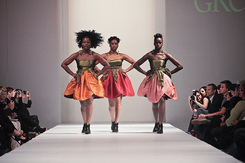Keeping Up Appearances
So I’ve been watching the industry with a wary eye and following the cultural conversation surrounding it. A lot of talk has centered on the inferiority that normal women feel when they compare themselves to air-brushed, tummy-tucked, photo-shopped and CGI enhanced models. Because while no one’s staging Occupy The Catwalk, beauty--in many ways--has become as exclusive as wealth, with the majority of it being held by the 1%.
In response, companies like Dove have launched “real beauty” campaigns, supermodels themselves have begun talking about the pressures of the industry, and the internet is full of memes contrasting a busty Marilyn Monroe with today’s waif-like fashionista. It seems like the solution to beauty inequality has been to promote inclusive beauty—everyone’s simply beautiful in their own way. Yet for all the discussion, for all the public service announcements, we don’t seem to have made much progress as a culture. And I think it’s simply because we’re not being honest with ourselves. We haven’t yet acknowledged what drives this industry--what drives us as human beings. We haven’t yet touched the darker side of our nature.
Because false definitions of beauty aren’t the problem--jealousy, covetousness, and lust are.
Only this morning I was flipping through my latest edition of Real Simple—not an industry standard by any stretch—and interspersed among the typical “balance your life and achieve perfection ads” were a couple of ads that struck me because of their transparency. One was selling Jones New York jeans with the tagline, “Keeping Up with the Jones’ [sic]” and the other was a spread for Sephora skincare. Their tagline? “Skin So Bright You’ll Make Everyone Else Look Dull.”
Finally, here is the truth. Because if we are really honest, the fashion and beauty industry isn’t propelled so much by becoming a better me, as it’s propelled by becoming better than you.
You see, we human beings have a difficult relationship with beauty. It’s not enough for us to simply appreciate it from a distance. No, we must possess it, we must own it, we must have it exclusively. And so while a man may lust after a woman, desiring to physically possess her beauty, women just as quickly lust after each other’s beauty, desiring to possess it in our own bodies. It is not enough that we are all beautiful. I must be more beautiful. I must be better than you. I must have your beauty for my own.
And it’s all vaguely reminiscent of another beautiful creature whose own beauty was not enough to content him.
For many of us, the solution is to teach our daughters that charm is deceitful and beauty is vain, but even in this, I don’t think that we go deep enough. It’s not that beauty simply hides the truth of a person’s negative character or even the false corollary that plainness can actually reveal greater spirituality. No, the truth is that beauty and charm deceive us and drive us through our lust, jealousy, and pride to aggressively fight to overcome each other.
The answer to this can’t simply be that everyone is beautiful or even that beauty is unimportant. No, the answer must be modesty. And not a modesty defined by skirt length or a lack of fashion sense, but a true modesty—a heart of modesty, a heart of meekness and humility. A heart that doesn’t use fabric or cosmetics or diets or anything else as a way to one-up someone else. A heart that doesn’t judge itself superior or try to draw attention to itself. A heart that is more concerned with making others beautiful than making itself so.
Because this kind of heart will overflow into hands and feet and lips and bodies that go about bringing beauty and joy and peace to everything and everyone they touch. This kind of heart—this truly modest heart--will produce girls and women who love others and love well. And trust me darling, if you do that, you will be dazzling.
